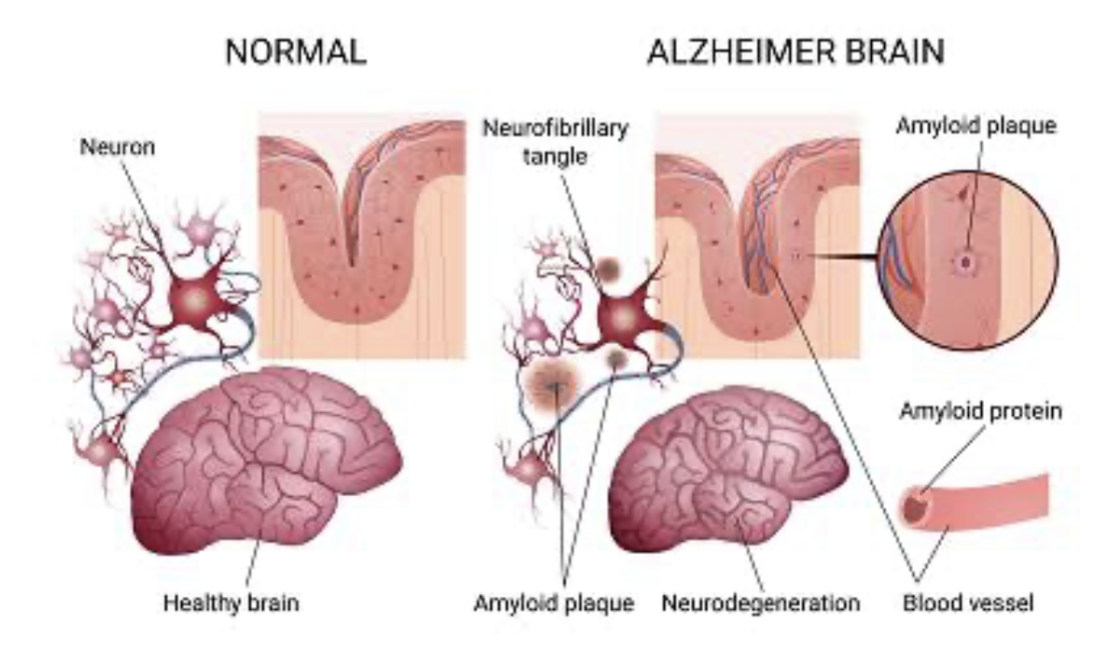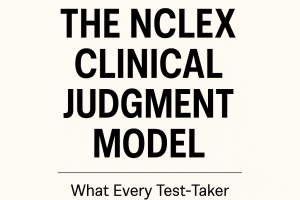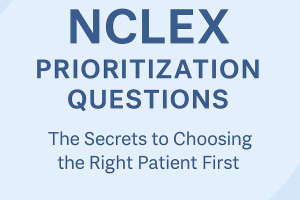COGNITIVE DISORDERS: ALZHEIMER’S DISEASE AND DEMENTIA ON THE NCLEX

Introduction
Cognitive disorders, such as Alzheimer’s disease and dementia, are major concerns in healthcare, particularly in aging populations. These conditions affect memory, thinking, behavior, and the ability to perform daily activities. For nursing students preparing for the NCLEX, understanding Alzheimer’s disease and dementia is crucial for both safe patient care and exam success.
This blog post will explore the key features of Alzheimer’s disease and dementia, discuss nursing interventions, and highlight strategies to answer NCLEX questions on this topic.
Understanding Alzheimer’s Disease and Dementia
Dementia Overview:
Dementia is an umbrella term for a group of cognitive disorders that impair memory, reasoning, and communication. While it is not a specific disease, it can result from various conditions, with Alzheimer’s disease being the most common cause.
Alzheimer’s Disease Overview:
Alzheimer’s disease is a progressive, neurodegenerative disorder characterized by the buildup of amyloid plaques and tau tangles in the brain. These changes disrupt neuron communication, causing cognitive decline and behavioral changes.
Key Differences Between Dementia and Alzheimer’s Disease:
• Dementia: A general term; can be reversible in some cases (e.g., caused by vitamin deficiencies or infections).
• Alzheimer’s: A specific, irreversible disease and the most common cause of dementia.
Common causes of dementia:
• Alzheimer’s disease
• Vascular dementia (due to impaired blood flow to the brain)
• Lewy body dementia (linked to abnormal protein deposits)
• Frontotemporal dementia (affecting the frontal and temporal lobes of the brain)
Signs and Symptoms
Alzheimer’s Disease:
• Early-stage: Forgetfulness, difficulty finding words, misplacing items.
• Middle-stage: Increased memory loss, confusion, difficulty with activities of daily living (ADLs).
• Late-stage: Severe cognitive decline, inability to recognize loved ones, loss of physical abilities.
Dementia:
• Memory loss interfering with daily life.
• Difficulty solving problems or concentrating.
• Confusion with time or place.
• Mood or personality changes.
Recognizing these symptoms is crucial for early intervention and care planning.
Nursing Interventions for Alzheimer’s Disease and Dementia
Promoting Safety:
• Prevent falls by removing hazards and using assistive devices.
• Use locks and alarms to prevent wandering.
• Keep harmful objects out of reach.
Enhancing Communication:
• Use simple, clear instructions.
• Maintain eye contact and use non-verbal cues.
• Allow extra time for responses.
Supporting ADLs:
• Encourage independence while offering assistance as needed.
• Break tasks into smaller steps.
• Use visual or verbal prompts to guide activities.
Providing Emotional Support:
• Offer reassurance to reduce anxiety or confusion.
• Engage in reminiscence therapy to stimulate memories.
• Foster a calm, structured environment.
NCLEX Tips: Prioritizing Care for Patients with Cognitive Disorders
• Use Maslow’s Hierarchy of Needs to prioritize safety, especially for patients at risk of wandering or injury.
• Expect questions involving family education on disease progression, coping strategies, and caregiver support.
• Know common medications like cholinesterase inhibitors (e.g., donepezil) and their side effects.
NCLEX-Style Questions and Rationales
Question 1:
A nurse is caring for a patient with moderate-stage Alzheimer’s disease. The patient is confused about time and place. What is the best intervention to promote orientation?
A. Provide a clock and calendar in the patient’s room.
B. Ask the patient to name the current day and year repeatedly.
C. Discourage conversations about past events.
D. Place the patient in a dark, quiet room.
Answer: A. Provide a clock and calendar in the patient’s room.
Rationale: Visual aids like clocks and calendars can help reorient patients with Alzheimer’s disease.
Question 2:
Which of the following is a priority intervention for a patient with late-stage Alzheimer’s disease?
A. Encourage participation in decision-making.
B. Provide assistance with all activities of daily living.
C. Reorient the patient to time and place hourly.
D. Focus on reminiscence therapy.
Answer: B. Provide assistance with all activities of daily living.
Rationale: In late-stage Alzheimer’s, patients require full support for ADLs due to severe cognitive and physical decline.
Question 3:
A family member asks about the difference between dementia and Alzheimer’s disease. What is the nurse’s best response?
A. Dementia and Alzheimer’s disease are the same condition.
B. Dementia refers to a group of symptoms, while Alzheimer’s is a specific disease.
C. Dementia is always reversible, but Alzheimer’s is not.
D. Alzheimer’s disease affects younger adults, while dementia only occurs in seniors.
Answer: B. Dementia refers to a group of symptoms, while Alzheimer’s is a specific disease.
Rationale: Dementia is a general term, whereas Alzheimer’s disease is a specific, irreversible cause of dementia.
Question 4:
The nurse is educating a caregiver about sundowning syndrome in patients with Alzheimer’s disease. Which statement indicates a need for further teaching?
A. “I will keep the lights dim in the evening to promote relaxation.”
B. “I will establish a consistent evening routine.”
C. “I will reduce environmental noise and distractions at night.”
D. “I will ensure the patient avoids caffeine in the evening.”
Answer: A. “I will keep the lights dim in the evening to promote relaxation.”
Rationale: Sundowning syndrome often involves increased confusion and agitation in the evening. Keeping lights on can help reduce disorientation.
Question 5:
Which statement about medications for Alzheimer’s disease requires correction?
A. “Medications can cure Alzheimer’s disease.”
B. “Cholinesterase inhibitors may help slow disease progression.”
C. “Medications like donepezil can improve cognitive symptoms temporarily.”
D. “It’s important to monitor for side effects such as nausea or diarrhea.”
Answer: A. “Medications can cure Alzheimer’s disease.”
Rationale: There is no cure for Alzheimer’s disease; medications can only slow progression or manage symptoms.
Conclusion
Understanding Alzheimer’s disease and dementia is essential for effective nursing care and NCLEX success. By recognizing key symptoms, implementing appropriate interventions, and educating families, nurses play a critical role in improving the quality of life for patients with cognitive disorders.
As you prepare for the NCLEX, focus on safety, patient-centered care, and the pathophysiology of these conditions. With the right knowledge and strategies, you’ll feel confident addressing these topics in both exams and clinical practice.






